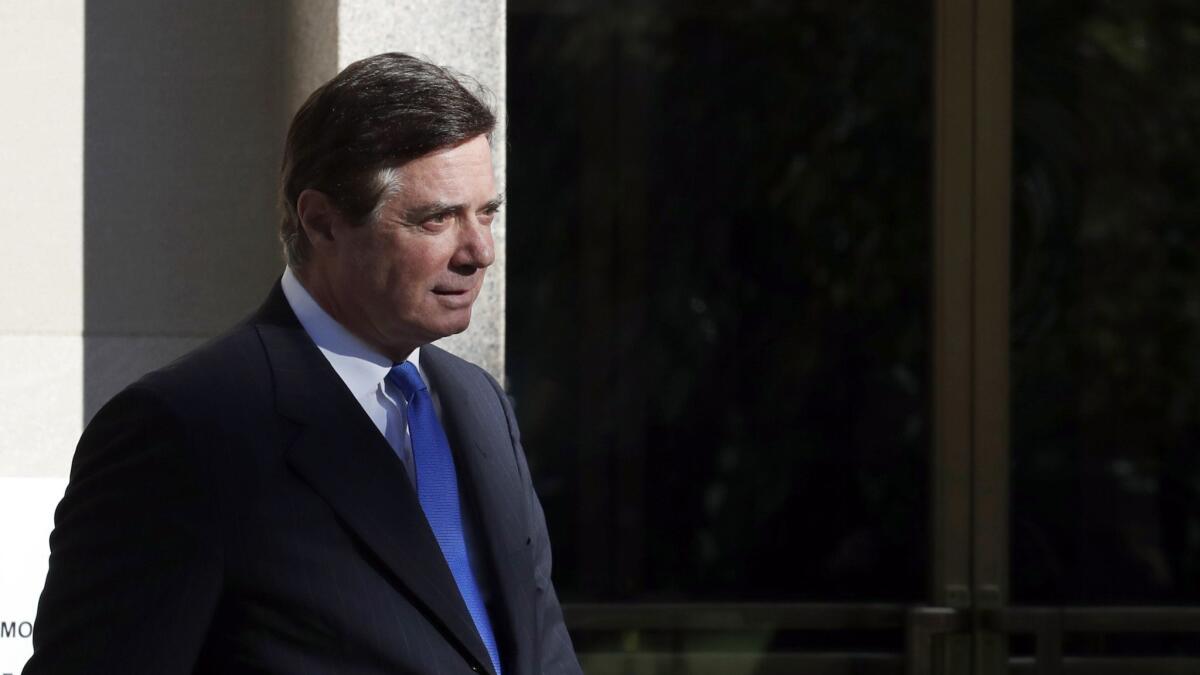Paul Manafort is a ‘hardened’ and ‘bold’ criminal, Mueller prosecutors tell judge in sentencing report

- Share via
Paul Manafort “repeatedly and brazenly violated the law” and shows a “hardened adherence to committing crimes,” prosecutors told a Washington federal judge in their sentencing memo for President Trump’s former campaign chairman.
But they recommended no specific punishment for the crimes detailed in his Washington case, saying that is the practice of special counsel Robert S. Mueller III, whose office brought the case.
Prosecutors noted that federal guidelines call for a sentence of 17 to 22 years, although under Manafort’s guilty plea in his D.C. case, the maximum he faces behind bars is 10 years. The special counsel team said it may ask Judge Amy Berman Jackson to impose a sentence that runs after any prison time Manafort is given for related crimes in Virginia federal court.
“Manafort chose repeatedly and knowingly to violate the law,” prosecutors said, from “garden-variety crimes such as tax fraud, money laundering, obstruction of justice, and bank fraud” to “more esoteric laws” involving foreign lobbying.
He lied, they noted, “to tax preparers, bookkeepers, banks, the Treasury Department, the Department of Justice National Security Division, the FBI, the Special Counsel’s Office, the grand jury, his own legal counsel, Members of Congress, and members of the executive branch of the United States government.”
He committed crimes while leading a presidential campaign and while out on bail before trial, and then lied to investigators after pleading guilty, prosecutors said, revealing “a hardened adherence to committing crimes and lack of remorse.”
The charges in both cases flow from Mueller’s investigation into Russian interference in the 2016 election. The filing helps pave the way for Manafort’s sentencings in D.C. and Virginia scheduled for next month, as Mueller is thought to be beginning to wrap up his probe.
But the redacted public document gives no details about Manafort’s campaign interactions with Russians. Prosecutors had previously asked the judge for permission to seal material either because it related to “ongoing law enforcement investigations” or “uncharged individuals.”
As part of a plea deal in September, Manafort, 69, acknowledged he was guilty of everything he was accused of in Washington and Virginia: making millions as an unregistered lobbyist for Ukrainian politicians, hiding that money to avoid paying taxes, defrauding banks to pay his debts when his oligarch patrons fell out of power, and lying to cover up his crimes while trying to persuade witnesses to do the same.
When he appears in front of Jackson on March 13, he will already have been sentenced March 8 for related crimes in federal court in Alexandria, Va., barring any change in the scheduling now set for those hearings. Jackson could make the sentence she imposes run during or after his Virginia prison term. In Virginia, where Manafort was found guilty of bank and tax fraud at trial, there is no upper limit to his sentence.
In Alexandria, prosecutors have asked only for a “serious” sentence. Federal guidelines in that case call for him to spend 19 to 24 years in prison.
Mueller’s prosecutors have been handing off other pending legal matters to the U.S. attorney’s office for D.C., and the Department of Justice is readying for Mueller to formally conclude his work.
In New York, the Manhattan district attorney is preparing to charge Manafort with violating state tax laws and committing other financial crimes, a move designed to ensure Trump’s former campaign chief spends time in prison if the president pardons him for the convictions stemming from Mueller’s probe, Bloomberg News and the New York Times reported Friday.
Trump has not indicated whether he intends to pardon Manafort, though he repeatedly expressed support for him as his trial played out last year. New York’s double-jeopardy law, which protects defendants from being prosecuted twice for the same crimes, could pose a challenge for the district attorney’s office, however.
Attorneys for Manafort are not due to file their sentencing recommendation in Washington until Monday. Jackson granted them a delay after they said a snowstorm in the area this week made it harder to meet with their client in the Alexandria jail where he has been held.
Under Manafort’s plea agreement in Washington, federal prosecutors had agreed to ask Jackson to give him credit at sentencing for cooperation. But because she found he lied to investigators and breached that agreement, they are no longer bound by it.
Jackson found Manafort lied about his interactions with Konstantin Kilimnik, a longtime aide who the FBI assessed to have ties to Russian intelligence. Those contacts, prosecutors said in court, go “very much to the heart of what the special counsel’s office is investigating.”
Manafort gave inconsistent accounts of an August 2016 meeting in New York City at which he and Kilimnik discussed a “peace plan” for Ukraine, a top foreign policy priority for Russia. At the time, Manafort was still leading Trump’s campaign. He also lied about sharing polling data with Kilimnik in 2016, prosecutors said in describing how he broke his deal to cooperate truthfully.
Paul Manafort continued Ukraine work in 2018, prosecutors say »
The judge also concluded that Manafort lied about a payment that he claimed was a loan, and as part of another Justice Department investigation whose focus has not been described publicly.
Defense attorneys have maintained that Manafort did not intentionally give false information and that any inconsistencies were honest mistakes.
In 2017, Kilimnik denied to the Washington Post having connections to Russian intelligence. He was indicted with Manafort on charges of conspiring to obstruct justice through witness tampering.
Kilimnik is believed to be in Moscow and therefore probably safe from arrest because Russia does not extradite its citizens.
Rachel Weiner writes for the Washington Post.
More to Read
Get the L.A. Times Politics newsletter
Deeply reported insights into legislation, politics and policy from Sacramento, Washington and beyond. In your inbox twice per week.
You may occasionally receive promotional content from the Los Angeles Times.







